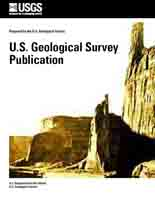Biosolids, soil, crop, ground-water, and streambed-sediment data for a biosolids-application area near Deer Trail, Colorado, 2001
Links
- More information: Publisher Index Page (html)
- Download citation as: RIS | Dublin Core
Abstract
In January 1999, the U.S. Geological Survey (USGS) began an expanded monitoring program near Deer Trail, Colorado, in cooperation with the Metro Wastewater Reclamation District and the North Kiowa Bijou Groundwater Management District. Monitoring components were biosolids, soils, crops, ground water, and streambed sediment. The monitoring program addresses concerns from the public about chemical effects from applications of biosolids to farmland in the Deer Trail, Colorado, area. Constituents of primary concern to the public are arsenic, cadmium, copper, lead, mercury, molybdenum, nickel, selenium, zinc, plutonium, and gross alpha and beta activity, and they are included for all monitoring components. This report presents chemical data from the third year of the monitoring program, January-December 2001, for biosolids, soils, alluvial and bedrock ground water, and streambed sediment. The ground-water section also includes climate data, water levels, and results of statistical testing of selected data for trends and for exceedance of Colorado regulatory standards. The chemical data include the constituents of highest concern to the public in addition to many other constituents.
Suggested Citation
Yager, T., Smith, D., and Crock, J.G., 2004, Biosolids, soil, crop, ground-water, and streambed-sediment data for a biosolids-application area near Deer Trail, Colorado, 2001: U.S. Geological Survey Open-File Report 2004-1388, 76 p., https://doi.org/10.3133/ofr20041388.
ISSN: 2331-1258 (online)
| Publication type | Report |
|---|---|
| Publication Subtype | USGS Numbered Series |
| Title | Biosolids, soil, crop, ground-water, and streambed-sediment data for a biosolids-application area near Deer Trail, Colorado, 2001 |
| Series title | Open-File Report |
| Series number | 2004-1388 |
| DOI | 10.3133/ofr20041388 |
| Year Published | 2004 |
| Language | English |
| Publisher | U.S. Geological Survey |
| Description | 76 p. |


